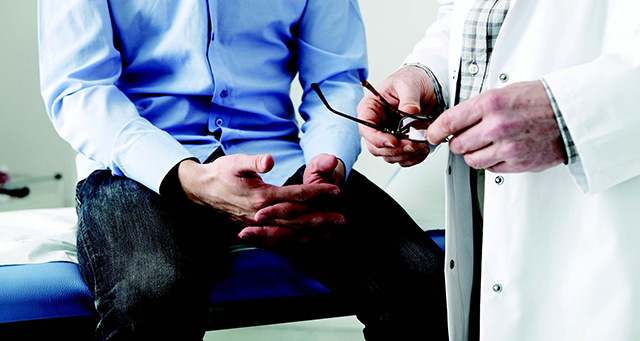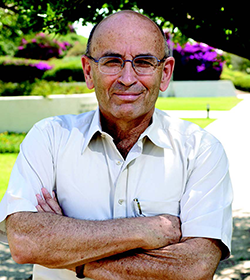
Prostate cancer is the second most common type of cancer – and the second leading cause of cancer-related deaths – among American men. According to the Centers for Disease Control and Prevention (CDC), one in six men will be diagnosed with prostate cancer during his lifetime.
Three leading researchers in this field – Prof. Avigdor Scherz of the Department of Plant Sciences at Israel’s Weizmann Institute of Science; Dr. Peter Scardino, Chair of the Department of Surgery at Memorial Sloan Kettering Cancer Center (MSKCC) in New York City; and Dr. Peter Schulam, Chair of the Department of Urology at the Yale School of Medicine, New Haven – agree that safer, more effective detection methods and treatments are needed for the more than 240,000 men diagnosed with prostate cancer each year. Speaking at an event co-sponsored by the New York Region of the American Committee for the Weizmann Institute of Science and the Association of Yale Alumni in Medicine, the researchers described the current state of prostate cancer diagnosis and therapy and discussed their collaboration on a highly promising new treatment.
Clinical trials showed that vascular-targeted photodynamic therapy eliminates early-stage prostate tumors without significant side effects.
Typically, men are screened for prostate cancer via digital rectal exam and measurement of their blood levels of a protein called prostate-specific antigen (the latter is commonly referred to as the PSA test). If either result is abnormal, the physician is likely to recommend a biopsy of the prostate.
Unfortunately, there are several limitations to this diagnostic process. “For example, PSA is not a perfect marker of disease – it’s a protein that can be elevated not only by cancer, but also by infection or benign growth of the prostate,” Dr. Schulam said. Thus, many men with an elevated PSA level wind up having unnecessary biopsies.
Dr. Scardino added that a typical biopsy involves taking 12 random tissue samples from the prostate. “The possibility of missing something that is very dangerous is real, because it’s a random sample, and we really need to get away from that – we’d like to develop a targeted biopsy,” he said.
Another challenge is deciding whether patients with prostate tumors that are unlikely to become life threatening should be treated with surgery or radiation. Those therapies target the entire prostate and can have significant side effects, including urinary incontinence and erectile dysfunction.

Prof. Avigdor Scherz
Such problematic issues underscore the need for new therapeutic approaches. One such method, focal therapy, could offer advantages over traditional therapies for these low-risk patients, noted Dr. Scardino. “Instead of trying to knock out the whole prostate gland with surgery or radiation, you just treat the area with the cancer in it,” he said.
Recently, he, Prof. Scherz, and urologic surgeon Dr. Jonathan Coleman of MSKCC began developing and testing a form of focal therapy called vascular-targeted photodynamic therapy, or VTP.
In earlier work, Prof. Scherz and his longtime collaborator Prof. Yoram Salomon of Weizmann’s Department of Biological Regulation created light-sensitive compounds derived from the chlorophyll found in aquatic bacteria, ultimately developing the compounds into the drug Tookad-soluble®. In their VTP, Tookad-soluble® is delivered to the tumor site, then activated by light from highly focused fiber-optic lasers. The drug turns toxic, destroying the tumor while having a minimal effect on healthy tissue.
Current therapies affect the whole prostate, instead of just the cancerous area. The new vascular-targeted photodynamic therapy targets only the cancer cells.
Clinical trials of the VTP for early-stage, localized prostate cancer included several hundred patients at MSKCC and at medical centers in Europe, Canada, and Israel. The trials showed that VTP was effective in eradicating the prostate tumors and did not cause significant side effects.
Now, the Weizmann–MSKCC team is preparing to test VTP for use against more advanced stages of prostate cancer in animal models. They are also investigating whether modulating the immune system during VTP can improve the effectiveness and safety of the treatment, and even whether it might help the body develop anti-tumor immunity. Prof. Scherz said that this approach showed promising results in animal studies, and could potentially be used for both early-stage and more advanced prostate cancers.
“We’re trying to see whether we can boost the immune system of the patient while they’re undergoing VTP therapy so that it’s as if they’re undergoing a vaccination,” he said.
Ultimately, Prof. Scherz and his collaborators hope their studies will result in new, minimally invasive treatment options for patients with any stage of prostate cancer. It also appears that VTP may be efficacious for other solid tumors; possible future targets include breast, ovary, lung, and gastrointestinal tumors.
With side effects such as urinary incontinence and erectile dysfunction, the need for improved prostate cancer therapies is clear.
For his part, Prof. Scherz said he is grateful to the Weizmann Institute for giving him the opportunity to translate his basic research into new therapies. “It’s a pleasure to be able to go from the research to the clinical application and then back to the research,” he said. “I don’t think there are many other places besides the Weizmann Institute where this is possible.”
Prof. Avigdor Scherz’s research is supported by the Leona M. and Harry B. Helmsley Charitable Trust; the Wade F.B. Thompson Charitable Foundation; the Susan G. Komen Breast Cancer Foundation; the Principal Anstalt; Sharon Zuckerman, Canada; Dana and Yossie Hollander, Israel; and the estate of Nathan Baltor. Prof. Scherz is the incumbent of the Robert and Yadelle Sklare Professorial Chair in Biochemistry. Prof. Yoram Salomon’s research is supported by the Principal Anstalt. Prof. Salomon is the incumbent of the Charles W. and Tillie K. Lubin Professorial Chair of Hormone Research.
